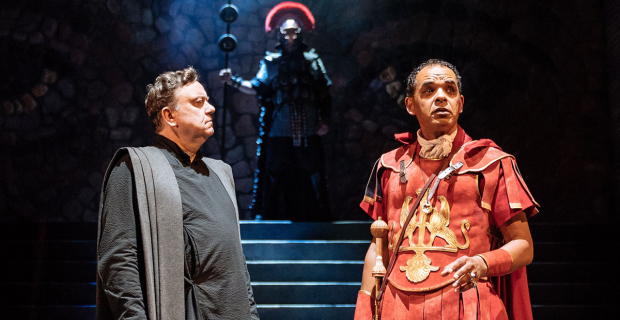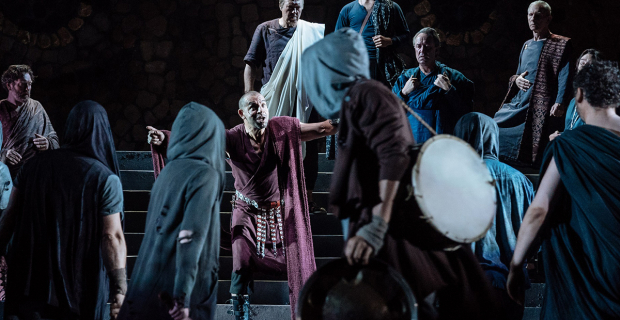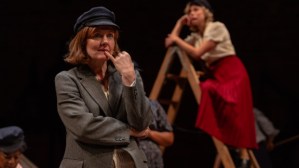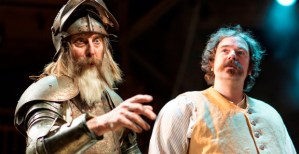Review: Imperium, Parts I and II (Gielgud Theatre)
Mike Poulton’s adaptation of Robert Harris’ novels comes to the West End

© Manuel Harlan
Robert Harris is a masterful story-teller and his trilogy of novels about the Roman statesman, thinker and orator Cicero had the tug and pull of an engrossing thriller. Playwright Mike Poulton is a masterful adaptor of such things for the stage (he did great things with Hilary Mantel's Wolf Hall), and his compression of these mighty tomes into two plays for the Royal Shakespeare Company has the shape of an epic.
It opens and closes with a body, killed in grisly circumstances, and in between packs in nearly 30 turbulent years of Roman history as the republic flails in its death throes to be replaced by the dictatorship of first Julius and then Augustus Caesar. The first play, Conspirator, broadly shows Cicero's triumphs, the way he turns himself into "the Father of the Republic", seeing off the ambition of the aristocratic Catiline; the second Dictator, charts his fall, as his vanity and his belief in his own abilities to turn the tide of events by the power of his oratory keep pulling him back to try to stop the rise of tyranny, with ultimately disastrous results.
Both last about three and a half hours, but the first is much better than the second. The whole thing is narrated by Cicero's slave Tiro (a magnificent, lively performance by Joseph Kloska) who wrote his master's biography and collected his works. This lends proceedings an amusing, irreverent tone – "There are a lot of characters in my story and quite a lot of them are called Gaius. Do try to keep up," he tells us, jovially.
The themes discussed are serious – the way men (and it is virtually all men) wield power and seek it. But the delivery is energetic. Richard McCabe's enthralling Cicero literally bounces around the stage, dancing on his toes, thrilled with his own cleverness, challenging all comers. As Julius Caesar, writhing beneath the water like a shark, waiting his moment, Peter De Jersey displays a similar exuberant physicality, exuding charisma and a watchful power.

© Manuel Harlan
The writing has terrific flex and bite too: parallels with our own time emerge easily. Military commander Pompey's blond hair resembles Donald Trump's, but more importantly the constant calls of the politicians to the populace for their backing, and their manipulation of the popular vote shouts down the years. "The man's barking" someone remarks of the belligerent Catiline at one point. "In my experience, it's never been an obstacle to high office," Cicero remarks wearily. "Stupid people tend to vote for stupid people." The fragility of the structures – the law, democracy – that people believe will save them, is made all too clear.
Director Greg Doran provides great little details too. Every time anyone mentions Cicero's lack of military experience, he blenches. The Senate sit, in Anthony Ward's fixed set overlooked by huge eyes made of tiles, like Raphael's scholars on a rising flight of stairs, contemplating the end of their idealism. Caesar's clothes slowly change from the simple to the regal; purples and reds appear alongside soldiers and the trappings of military authority.
The second play still tells a good story, but it gets more bombastic. There are more echoing set pieces, stiffly staged. The acting, led by a wild turn from Joe Dixon as a drunken Mark Antony, who bears no resemblance to either of Shakespeares's versions of him, becomes generally more declamatory and less closely observed. The narrative, though still compelling, just becomes Roman; that sense of relevance to a wider world (conjured by the huge globe that hangs above the action, reflecting events on its surface) is less intense.
Siobhán Redmond, one of the few women with a role worth talking about as Cicero's wife Terentia, fades from view and you miss her presence. Fulvia, who had real power in Rome thanks to three powerful marriages (she had her head on a coin) is presented as a shrieking harridan with whom Eloise Secker can do little.
What holds the entire thing together is the interplay between Kloska as Tiro and McCabe as Cicero. McCabe is one of those actors who always makes you happy when you see his name on a cast sheet, but he is usually playing support. To see him here, centre stage, mining every aspect of Cicero's personality, whether speaking or listening, is an absolute pleasure. His performance is a five-star triumph.





















